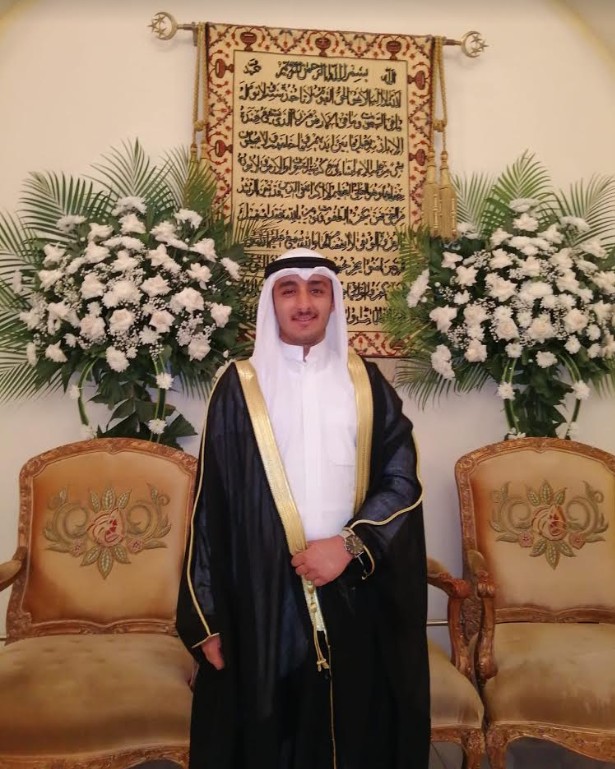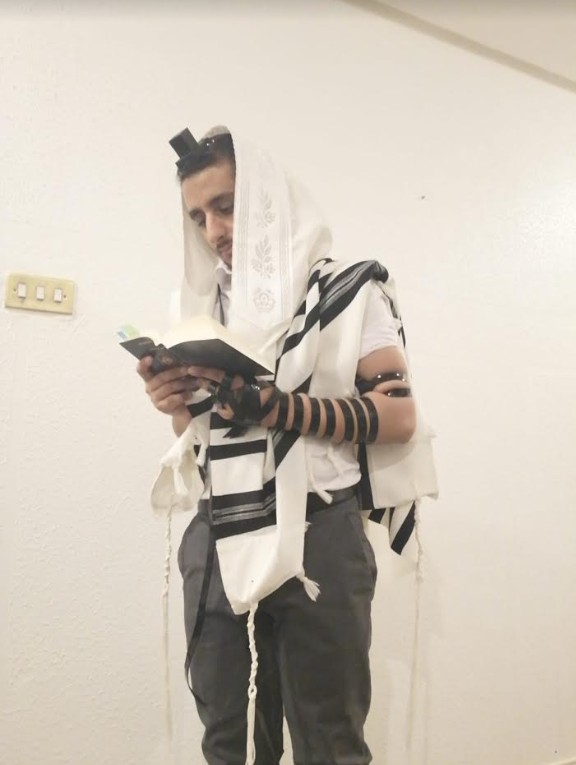The Muslim Who Decided to Convert: "I Receive Threats from the Arab Gulf, But I Will Not Give Up"
Naftali Ben Yehuda fled Kuwait to join the Jewish people. In a captivating interview, he talks about his conversion process that was halted, life in Britain during the COVID-19 pandemic, the threats he receives, and the anti-Semitic incidents he encounters in London. Plus: his message to Avigdor Lieberman.

At first, Naftali Ben Yehuda was sure it was a mistake. But he soon realized that yes, indeed, the destructive and mocking shouts disrupting the peace in the quiet English town were directed at him. The anti-Semitic remarks hurled at him by a young man of Turkish descent in the center of Camden Town, London, shook the soul of this young Muslim who not long ago chose to join the Jewish people.
It was an ugly anti-Semitic attack of the kind currently sweeping Europe. However, this time, the anti-Semitic cries were not directed at a Jewish person but at Naftali Ben Yehuda, a young Muslim from Kuwait, who is currently in the midst of his conversion process, on his way to becoming part of the Jewish people. "That was the moment I realized I am part of the Jewish people: the persecuted people," says Naftali, adding, "Since I walk around with a kippah and tzitzit, I expected to encounter anti-Semitic remarks. Indeed, I've faced anti-Semitic incidents several times since adopting Jewish attire. If it weren't so sad, it would be ironic that I, formerly anti-Semitic myself, who despised everything associated with the Jewish people, am now subjected to anti-Semitic slurs.
"Following that incident, I came to understand that England is not the place for the Jewish people. The Jews of the kingdom should make aliyah to the Land of Israel: the home of the Jewish people and the only place where Jews can live peacefully," he states.
"The Question That Changed My Life"
Naftali Ben Yehuda (25) was born and spent most of his life in Kuwait, in the Arabian Gulf. In his youth, Naftali behaved like his fellow children, showing no sign of what was to come. The turning point in his life came after a question posed by a childhood friend. "Why do you hate the Jews?" This was "the question that changed my life," Naftali recounts.
"This question surprised me, as Kuwait is considered particularly anti-Semitic by any measure," he explains. "As a child, I absorbed all possible stereotypes against the Jewish people, from the claim that Jews control the entire world, to the belief they are a people of thieves and liars. In the country I lived in, every word from the anti-Semitic 'Protocols of the Elders of Zion' was embraced. We were taught as children that the Jewish people and the State of Israel are responsible for all the misfortune afflicting the Arab countries. Unrealistic as it sounds, these are the views of many citizens of the Arabian Gulf. From a young age, children are taught there that the Jewish people are hostile to Arab countries and that Jews are to blame for the poverty and lack in Arab countries. According to their claims, generally, all Arabs' troubles stem from the existence of the Jewish people and the State of Israel."
This question troubled Naftali and led him to become interested in the Jewish people and the State of Israel from that day on, to check if what he learned about Jews was true. What he discovered surprised him greatly. "As I delved deeper into my research, it became clear to me there was no reason to hate the Jewish people. To my utmost surprise and contrary to everything I had believed until then, I discovered that in Israel's Supreme Court, there's an Arab judge named Salim Joubran, and even in the Knesset - the Israeli Parliament - there are Arab members from several parties who express their views without fear of the Jewish majority." Naftali's discoveries didn't end there. Interestingly, he found that Israeli Arab citizens are quite content with being Israeli and refuse to move to other Arab countries. "This proved to me there's no discriminative treatment of the Arab public in Israel, and moreover, that Arabs enjoy equal rights and full democratic rights in democratic Israel," he says.
"After these revelations, I became more and more interested in the State of Israel. I studied its governing institutions; the complex political system within it; the places sacred to the Jewish people and the ideologies of the political bodies operating there. Yet, I felt I still didn't know everything. After all my inquiries, I still didn't know the essence of Israel's Torah, and I understood that as long as I didn't know the core of Jewish religion, I was missing significant understanding about the State of Israel, so I decided to research its religious principles.
"In my searches, I stumbled upon a book that addresses the validity of the Torah. That book explains with great skill why the Jewish Torah is true. For example, it clarifies that the Torah of Israel is the only one given in the presence of the entire people before millions of witnesses. Unlike religions like Islam and Christianity, where individuals claimed to have witnessed a revelation and led waves of believers, in Judaism, it was different. The entire Jewish people witnessed thunder and shofar when the Torah was given. This is a significant proof of the truth of Israel's Torah."

Naftali's enthusiasm increases as he explains how accurate Israel's Torah is. "This interview is too short to cover all the evidences and wonderful foundations presented in that book," he says, "but even a brief summary suggests how accurate and correct Israel's Torah is, unlike any other religion in the world."
Escaping Kuwait
After finishing the book, Naftali resolved to convert. "I also understood that if I wished to choose the true faith, I would need to take a drastic step, which involves leaving Kuwait. In the Arabian Gulf, one cannot live as a Jew, certainly not as a Muslim who has converted, contrary to the State of Israel, which allows Muslims to live within its borders without disturbance."
During that time, Naftali learned Hebrew with the help of an Israeli teacher, while simultaneously planning his next step - escaping the Arab country. In a strenuous journey, he established contact with Channel 11, a connection that led to Naftali's first interview, where he first revealed his story and intention to convert. "Before the interview, it was agreed that the channel would not air the program until I left Kuwait," he shares. "It was too dangerous for me to remain in Kuwait after such an interview. One could easily assume that the local police would arrest me once the details were published, but even without fear from the police, the citizens of the country and especially those around me might harm me, even to the point of murder, due to my wish to leave Islam. To this day, I'm careful not to reveal details about my daily schedule or location to protect my life. Europe is saturated with the blood of Muslims who have converted or offended Islam."
After decisively planning to leave everything behind, he carefully planned his moves, packed important belongings, settled open accounts, bought a one-way plane ticket, and fled to England. Five years after first being asked the life-changing question, Naftali found himself walking the streets of the United Kingdom, on his way to join the Jewish people.
Upon his arrival in London, the article based on his interview was published, assisted by Israel's Foreign Ministry, introducing his story as the Muslim aspiring to convert to the Arab world. Naftali Ben Yehuda became known overnight throughout the Arab Gulf. Later, Naftali was invited for an interview on the BBC's Arabic service, and even those who hadn't heard about his story until then, learned of it via the channel considered one of the most popular in the Arab world. Following the publication, slanders and threats to his life began to pour in, but in his interview with us, he clarifies that he is not afraid. "I am following the right path, and therefore I know I have nothing to fear," he says.
However, despite the threats that followed, Naftali stayed true to his plans. Upon arriving in London, he began knocking on the doors of the local rabbinical courts to convert. But soon he realized the complexity of the life of those seeking to convert. Not everyone wanting to join the Jewish people successfully does so. The Chief Rabbinical Court in London rejected the young man from Kuwait multiple times; his story was repeatedly scrutinized, and eventually, after much effort, Naftali Ben Yehuda's request was accepted, and he began the conversion process. "The rabbis saw my persistence and refusal to give up, and my story proved to them that I genuinely wished to become part of the Jewish people. After all, I left a family and a wealthy country like Kuwait, not knowing what to expect once I joined the Jewish people, while I lacked nothing," he recollects.
How did your surroundings in Kuwait react when they found out you decided to convert?
"My community was very surprised by my step. It was the first time in Kuwait's history that a resident within its borders decided to take such a step, leave Islam, and convert."
Nothing stood in the way of the young Arab on his journey to the Jewish people; the hurdles thrown his way were removed with his characteristic determination, and he seemed to be rapidly becoming one with the Jewish people. The preparations progressed swiftly, the rabbinical court discussions were favorable, but the conversion process was halted with the outbreak of the coronavirus crisis.
The coronavirus altered lives globally. The world's most visited areas became ghost towns following the outbreak. In the UK, initially dismissive of the virus, quickly shifted gears after witnessing the devastation in nearby Italy and declared a state of emergency. Gatherings were banned, and alongside all religious institutions closing, the rabbinical courts also shut down. Naftali's conversion process, which was in full swing, was stopped right before its completion. The coronavirus paused the conversion process, leaving Naftali isolated in the kingdom.
These days, Naftali awaits the completion of his now-halted conversion. Disappointment is evident in his voice when he talks about the unexpected delay. "It's very difficult," he says, expressing particular concern about the number of Jewish fatalities in England due to the coronavirus. "Dozens of Jews have already passed away after contracting the virus," he says with sorrow.

Another issue troubling him is the severe loneliness he faces. "Since Purim, I have been sitting alone in my apartment, and it's tough. Very tough. According to the government's directive, public events cannot be held, which means I cannot meet my friends in the Jewish community, which I miss greatly. I left Kuwait to connect with the Jewish people, so my current loneliness without meeting my Jewish acquaintances causes me a lot of sadness."
Naftali clarifies that before the crisis, he was quite involved in the local Sephardic community life. "The community welcomed me with open arms and great warmth. I used to attend the synagogue every morning, pray, study, and meet many friends. All that stopped suddenly," he notes.
Additionally, the coronavirus crisis prevents Naftali from progressing in his Jewish studies. Initially planning to celebrate Passover night with a Jewish family as part of his studies on Jewish holidays, the coronavirus pandemic led him to remain alone during the night of vigil. "I didn't celebrate Passover night," he admits. "I am still a gentile, so I don't have to keep the holidays. Nevertheless, I keep Shabbat as much as possible, and as you know, a gentile is forbidden from fully observing Shabbat, so once during Shabbat, I turn on the light, and that way it is considered that I'm not fully observing it."
And regarding aliyah to the Land of Israel?
"I want to raise my children in the Holy Land. I don't see myself staying here in London. England is not my home, nor the right place for me to build a family and live my life. I wish and hope to make aliyah to Israel soon."
Here, Naftali clarifies that making aliyah might be problematic for him because of his past. "At the embassy, they treated me unfavorably," he says. "I approached the gates of the Israeli embassy here in London and sought the help of those at the entrance. I shared my story with them and asked them to grant me Israeli citizenship, but they did not treat me nicely. They didn't even let me enter the building. I believe that once I complete the conversion process, the attitude toward me will change."
Nevertheless, Naftali justifies in a measured way the embassy staff's attitude toward him: "Israel's and its global representatives' security protocols are particularly strict. This is entirely understandable given what Israel has been through over the years," he says. According to him, "Israeli security forces fear that I may be a spy, and therefore they might also complicate my obtaining Israeli citizenship."
"Liberman Erred in Fighting the Religious"
While we are talking, the 'Blue and White' party disbanded as the initial step for Benny Gantz's path to forming a unity government with Netanyahu and Likud. Naftali says he identifies with the Israeli right. "I am close to the views presented by the religious Zionism members," he adds. He doesn't have good things to say about 'Israel Our Home' chairperson: "Liberman opened an unnecessary and wrong front against the religious. You shouldn't fight religion. Liberman is also responsible for the political instability that reigned in Israel in the past year and a half, and for the economic harm caused by it and all the other consequences, but I think now things are getting back on track, thank Hashem."
Finally, Naftali wishes to say to the Jews residing in Zion: "We pray for you, Jews of Israel, every day. With Hashem's help, we will overcome this pandemic, return to synagogues, yeshivot, and our families. Be strong in the meantime."
Can real conversion happen in a minute? Rabbi Zamir Cohen shares a fascinating story:

